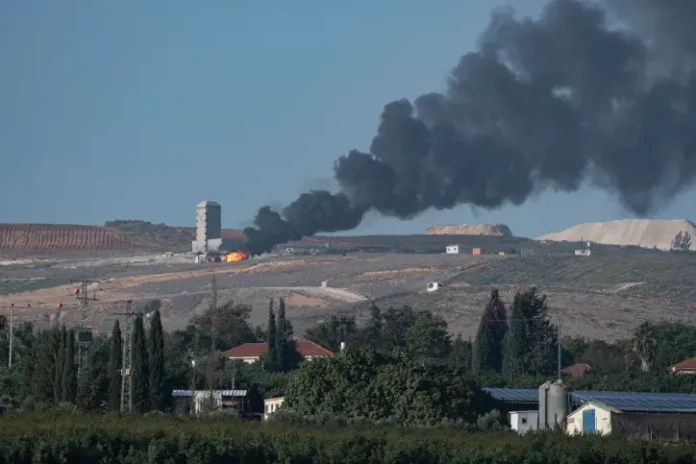In a significant escalation of hostilities, Lebanon’s Hezbollah launched dozens of rockets targeting an Israeli border town on Wednesday, prompting a swift response of heavy airstrikes from Israel on a Lebanese town just across the frontier.
This exchange marks the most intense confrontation between the two adversaries in nearly two decades, raising concerns about the specter of a broader and more devastating conflict.
Hezbollah, backed by Iran, claimed responsibility for the Katyusha rocket attack on the town of Shomera, situated along the volatile border.
The assault was reportedly a retaliation for Israeli strikes on Lebanese villages, including one that tragically claimed the lives of at least two individuals, including an 11-year-old girl, in Hanin the day before.
Responding to Hezbollah’s aggression, Israel conducted over 10 airstrikes targeting the Lebanese town of Ayta al-Shaab, located approximately 3 km from Shomera on the opposite side of the border.
The exchange of fire underscores the volatile nature of the Israel-Lebanon border and the potential for rapid escalation.
Hezbollah’s actions come amidst heightened tensions following its drone attack on Israeli military bases north of Acre, marking its deepest strike yet in the ongoing hostilities that have coincided with the conflict in Gaza.
The drone attack demonstrated Hezbollah’s evolving tactics, employing drones both to engage Israeli air defenses and to deliver explosives to targets within Israel.
The Israeli military, in response to the escalating threat posed by Hezbollah, announced on April 7 that it had completed preparations for a potential war along its northern front.
This readiness reflects the gravity of the situation and the determination of both sides to assert their respective interests.
While the recent clashes have been primarily concentrated along the Israeli-Lebanese border, with occasional Israeli strikes penetrating deeper into Lebanon’s Bekaa Valley, the toll on both sides has been significant.
Israeli strikes have reportedly claimed the lives of around 250 Hezbollah fighters in Lebanon since October 7, with an additional 30 casualties in neighboring Syria. This surpasses Hezbollah’s losses during the 2006 war with Israel.
In Lebanon, more than 70 civilians have tragically lost their lives in the crossfire, underscoring the devastating impact of the conflict on innocent bystanders.
Meanwhile, in Israel, the toll stands at 18 casualties, including both soldiers and civilians, highlighting the human cost of the ongoing hostilities.
As tensions continue to simmer, there are growing concerns about the potential for further escalation and the risk of a wider conflagration engulfing the region.
The international community remains on edge as efforts to de-escalate the situation and prevent further bloodshed become increasingly urgent.
This article was created using automation and was thoroughly edited and fact-checked by one of our editorial staff members

